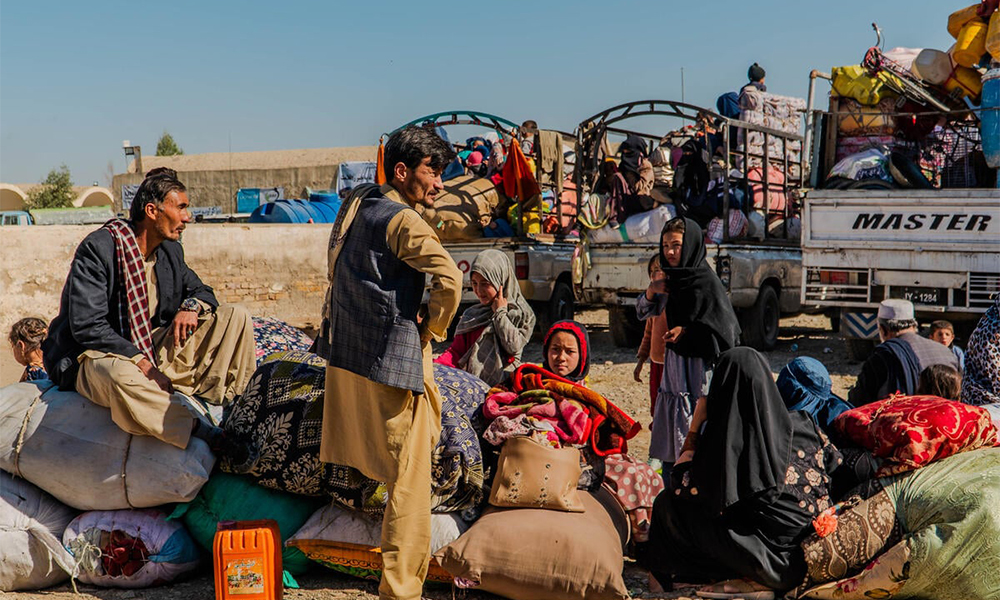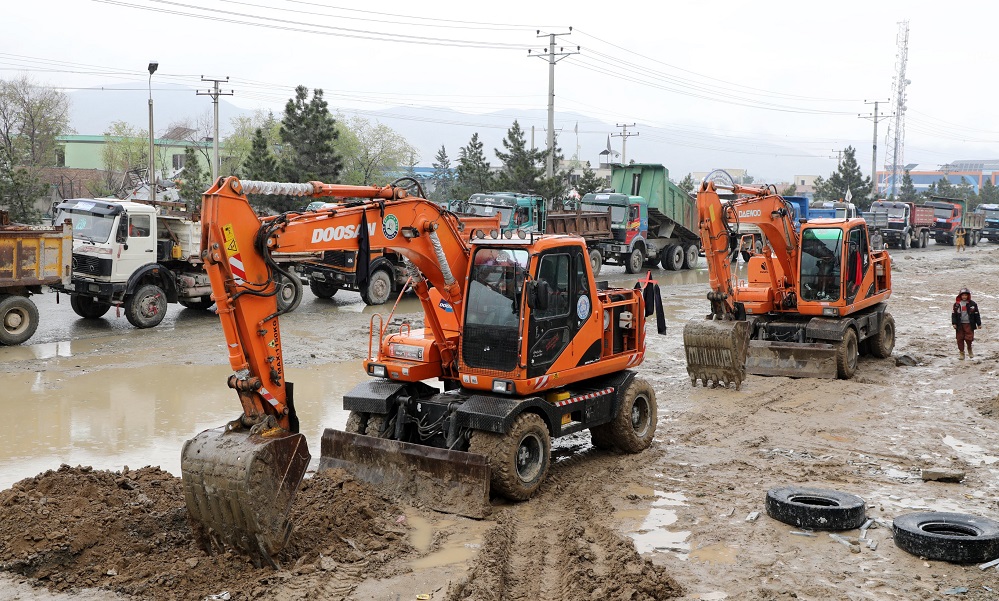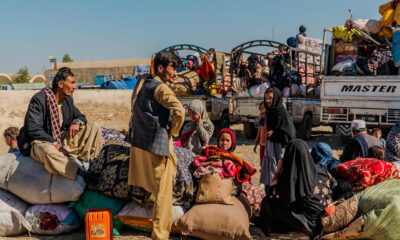Latest News
UN warns of impending acute food insecurity for the already struggling people of Afghanistan and Pakistan

The Global Report on Food Crisis produced by the Food Security Information Network, an international alliance of the United Nations (UN), the European Union (EU) and other agencies working to tackle food crises, which was released last month, drew urgent attention to the steep and alarming increase in the number of people worldwide experiencing acute hunger and requiring food, nutrition and livelihood assistance.
Acute food insecurity is defined as when a person’s inability to consume adequate food puts their lives or livelihoods in immediate danger.
The report concluded that the number of people facing acute food insecurity in 58 countries and territories in 2022 was 258 million, and this was the highest in the seven-year history of the report, signifying a deteriorating trend in global acute food insecurity.
In 2021, 193 million people in 53 countries and territories faced acute hunger, so the figure for 2022 reflected a 34% jump within just one year.
Among South Asian countries, Afghanistan was facing the most challenging situation, with the report including the country among seven nations that is assessed were on the brink of starvation.
The report assessed that the key drivers of this crisis were economic shocks, conflict/insecurity, and weather/climate extremes, with economic shocks (the socio-economic impacts of COVID-19 and the repercussions of the war in Ukraine) having surpassed conflict as the primary driver of acute food insecurity and malnutrition in several major food crises.
UN Secretary-General António Guterres, in the report’s foreword, drove home the harsh reality that “More than a quarter of a billion people are now facing acute levels of hunger, and some are on the brink of starvation. That’s unconscionable”.
The UN, meanwhile, published a report on 29 May that placed Afghanistan, Pakistan and Myanmar among the hunger hotspots across the world.
Titled ‘Hunger Hotspots: FAO and WFP early warnings on acute food insecurity’, the report has been jointly published by two Rome-based UN agencies, the Food and Agriculture Organization (FAO) and the World Food Program (WFP).
It marks 18 hunger hotspots across the globe where acute food insecurity is expected to increase in the period from June to November 2023.
The 18 hunger hotspots include two regional clusters and comprise 22 countries.
In these hotspots, the UN predicted that parts of the population already facing acute food insecurity will experience “significant deterioration”. While Afghanistan is at the “highest concern level”, Pakistan and Myanmar, the latter having been included in the latest UN report for the first time, have been marked as areas of “very high concern”.
The UN warned that economic, political, and social crises in these countries threaten to aggravate the problem of acute food insecurity and malnutrition.
The report pointed out that all the hotspots at the highest level have populations facing or projected to face starvation or are at risk of deterioration towards catastrophic conditions, given they already have critical food insecurity and are facing severe aggravating factors. These countries, therefore, require the most urgent attention.
The Pakistani daily Dawn reported on 30 May that according to the UN report, acute food insecurity in Pakistan was likely to rise in the coming months, especially so if the country’s prevalent economic and political turmoil intensified, aggravating the consequences of the devastating 2022 floods.
The report said that “Pakistan, the Central African Republic, Ethiopia, Kenya, the Democratic Republic of the Congo and the Syrian Arab Republic are hotspots with very high concern, and the warning is also extended to Myanmar in this edition”. It elaborated that, “All these hotspots have a high number of people facing critical acute food insecurity, coupled with worsening drivers that are expected to further intensify life-threatening conditions in the coming months”.
In Pakistan’s case, the report noted that amid the current global economic slowdown, mounting public debt had exacerbated the ongoing financial crisis in the country.
In addition to political turmoil, the country’s International Monetary Fund (IMF) financial bailout had been delayed for the past seven months. Pakistan has to pay back international creditors US$ 77.5 billion over the next three years, a substantial repayment amount bearing in mind the country’s GDP of US$ 350 billion in 2021.
The UN report added that growing political instability and lagging reforms in Pakistan were preventing the release of crucial new lines of credit from international organizations and additional support from bilateral partners. It predicted that, “The political crisis and civil unrest are likely to worsen ahead of general elections scheduled for October 2023, amid growing insecurity in the northwest of the country. A shortage of foreign reserves and a depreciating currency are diminishing the country’s ability to import essential food items and energy supplies and increasing food items’ prices besides causing nationwide energy cuts”. The situation has been compounded by the effects of last year’s floods, which caused damages and economic losses of Rs 30 billion to the agriculture sector.
According to the report, over 8.5 million Pakistanis were likely to experience high levels of acute food insecurity between September and December 2023.
Further, the food insecurity and malnutrition situation was likely to worsen, as economic and political crises were having the effect of reducing the purchasing power of households and their ability to buy food and other essential goods.
The Pakistani daily The Express Tribune noted that while political wrangles raged in public, in courts, and on the streets, Pakistan did not have the money to secure food imports on ships anchored at its ports. This resulted in shortages of even bare necessities, including wheat flour for the daily bread.
The Diplomat reported on 2 May that in March-April this year, the Pakistani government had set up distribution sites across the country to provide low-cost and free flour to people to ease their burden amid spiraling prices brought about by the ongoing economic crisis.
However, instead of benefitting the public, the initiative caused trouble in several places where stampedes broke out, killing and injuring people.
Alina Effendi, a member of The Express Tribune’s editorial team, in a timely 4 June article stressed that urgent action was needed to address malnutrition, which had become endemic in Pakistan.
She wrote, “In Pakistan, malnutrition poses a silent threat to the health, development and future of its people. Despite progress in various sectors, malnutrition remains alarmingly prevalent, hindering the nation’s growth and prosperity… Within Pakistan’s borders, millions of vulnerable individuals, especially children and women, silently bear the consequences of malnutrition. Shocking statistics reveal that nearly half of children under the age of five experience stunted growth, and 30% suffer from wasting. This situation highlights the seriousness of the issue and demands our unwavering attention”.
Effendi underlined that it was crucial for Pakistan to prioritize this crisis of malnutrition and take immediate action to address its root causes.
The UN report, meanwhile, recommended that Pakistan enhance the shock-responsive character of existing social protection mechanisms such as the Benazir Income Support Programme to promote effective preventive action and humanitarian response via social protection systems.
It called for building the capacity of national and provincial disaster management authorities to include forecast-based financing and risk insurance as part of disaster management and sectoral contingency plans.
Regarding Myanmar, the UN report said that in addition to a fragile economy and climate catastrophes like the recent Cyclone Mocha, conflict and repression under Myanmar’s military junta has further increased the risk of food security in the country in the past six months. The at-risk population increased by 2 million in 2022 compared to 2021.
The most precarious situation, as per the UN report, was in Afghanistan. The country has turned insular since the Taliban returned to power in August 2021, forcing women to stay at home. No country in the world has recognized the Taliban regime.
The report noted that falling humanitarian funding under international sanctions, a major source of foreign reserves for funds-deprived Afghanistan, coupled with drought-like conditions were likely to put 15.3 million people at the risk of high acute food insecurity in the country. As per the UN, 70% of people in Afghanistan already do not get two proper meals a day.
Economic and political crises are drastically reducing households’ purchasing power and ability to buy food and other essential goods.
The report said that economic and political crises in Afghanistan’s neighbor and main trading partner Pakistan will also worsen food security problems across the two nations. It noted that Afghanistan’s coal and food export revenues could drop if the economic and political crisis in Pakistan and the security situation in the border areas between the two countries continued to deteriorate.
Earlier, the UN’s Office for the Coordination of Humanitarian Affairs (OCHA) had observed that in all of Afghanistan, poverty and hunger had increased significantly since the Taliban retook control of the country. Approximately 28.3 million Afghans, or roughly two-thirds of the country’s population, will require urgent humanitarian and protective assistance in 2023, according to the organization’s findings.
The irony of the situation in Afghanistan is that possibly the most positive policy decision that the Taliban regime has taken since it came to power – banning the cultivation of poppy and rigorously enforcing that decision – is likely to add to the food insecurity that is plaguing the country. Yogita Limaye’s coverage for BBC News of the implications of the poppy cultivation ban threw some light on this aspect. Pointing out that Afghanistan used to produce more than 80% of the world’s opium, and that heroin made from Afghan opium made up 95% of the market in Europe, Limaye observed during her research on the ground in eastern and southern Afghanistan that the Taliban appeared to have been more successful in cracking down on poppy cultivation than anyone ever had been before. She wrote, “In April 2022, Taliban supreme leader Haibatullah Akhundzada decreed that cultivation of the poppy – from which opium, the key ingredient for the drug heroin can be extracted – was strictly prohibited. Anyone violating the ban would have their field destroyed and be penalised according to Sharia law… We found a huge fall in poppy growth in major opium-growing provinces, with one expert saying annual cultivation could be 80% down on last year. Less-profitable wheat crops have supplanted poppies in fields – and many farmers saying they are suffering financially… The evidence we saw on the ground is backed up by imagery taken from above. David Mansfield, a leading expert on Afghanistan’s drugs trade, is working with Alcis – a UK firm which specialises in satellite analysis. ‘It is likely that cultivation will be less than 20% of what it was in 2022. The scale of the reduction will be unprecedented’, he says. A large number of farmers have complied with the ban, and Taliban fighters have been destroying the crops of those that haven’t. Toor Khan, the commander of the Taliban patrol unit we are with in Nangarhar, tells us he and his men have been destroying poppy fields for nearly five months, and have cleared tens of thousands of hectares of the crop”.
The adverse economic impact that the Taliban’s otherwise laudable ban was having on a severely distressed population was evident from Limaye’s conversations with farmers whose poppy crops had been destroyed by Taliban enforcement teams.
Farmer Ali Mohammad Mia, when asked why he was cultivating poppy despite the ban, responded with “If you have no food at home, and your children are going hungry, what else would you do”. Another farmer said, “I can’t meet my family’s needs. I’ve had to take a loan. Hunger is at its peak and we haven’t got any help from the government”.
Urgent humanitarian action is needed to save lives and livelihoods and prevent starvation and death in hotspots where acute hunger is at a high risk of worsening.
As FAO Director-General QU Dongyu said in a statement, “We need to provide immediate time-sensitive agricultural interventions to pull people from the brink of hunger, help them rebuild their lives, and provide long-term solutions to address the root causes of food insecurity. Investing in disaster risk reduction in the agriculture sector can unlock significant resilience dividends and must be scaled up”.
Ensuring that predictable hazards do not become full-blown humanitarian disasters is very important in today’s fast-changing world in which millions are at risk, and as QU Dongyu put it, “Business-as-usual pathways are no longer an option in today’s risk landscape if we want to achieve global food security for all, ensuring that no one is left behind”.
Latest News
Red Cross official seeks ‘staggered’ return of Afghan refugees from Pakistan

A senior Red Cross official has called for the return of Afghan refugees from Pakistan to occur “in a more staggered way” so Afghanistan can better absorb them.
“It will be important to work with the government of Pakistan in 2024 to ask that if there are going to be returnees,” that they arrive “in smaller numbers at a time just so it is more manageable on the Afghan side,” said Alexander Matheou, regional director, Asia Pacific Region for the International Federation of the Red Cross, Voice of America (VOA) reported on Saturday.
Speaking in the Qatari capital, Doha, Matheou told journalists on Friday the challenges facing Afghan returnees from Pakistan was one of several pressing issues he discussed with the officials of the Islamic Emirate in Kabul.
“You will be aware that over half a million have crossed the border over recent months, and it is likely that we will see large numbers of new arrivals in the coming months,” he said.
“I imagine this is probably the largest population flow in a short period of time in Asia since the population movement from Myanmar into Bangladesh in 2017,” he added. “So, it is a significant event.”
Since October, Pakistan has expelled more than 500,000 Afghan refugees who lacked proper documentation.
Matheou noted many of the returnees have lived in Pakistan for decades and are ill-equipped to begin a new life in a country that to them is unknown, without government or international support.
He described the returnees as being in generally poor health, especially the children, who account for nearly half of all returnees.
“The evidence of that was we visited clinics where they reported a real spike in cases of acute malnutrition coming from the arrivals from Pakistan.
“We visited routine immunization programs of the IFRC and the Afghan Red Crescent in the villages, and there it was clear looking at the children that as well as being anemic, you could see wasting and stunting among the children,” he said.
Latest News
Turkmenistan committed to complete TAPI energy project

Turkmenistan is committed to complete the Turkmenistan–Afghanistan– Pakistan–India (TAPI) energy project together with the regional countries, Muhammetmyrat Amanov, CEO of TAPI Pipeline Company Limited, said.
“Turkmenistan is making significant progress on the TAPI natural gas pipeline, which aims to supply 33 billion cubic meters annually to South Asia” Amanov said speaking at the Turkmen Energy Investment Forum (TEIF 2024) in Paris.
He highlighted that the Turkmenistan section of the pipeline is complete and the ongoing discussions to advance the project beyond Turkmenistan are in strict alignment with international standards.
Amanov said the project emphasizes environmental sustainability by leveraging natural gas to reduce emissions significantly compared to coal and oil, thereby tackling indoor pollution and enhancing regional air quality.
“In light of the ongoing project developments, Turkmenistan remains committed to upholding international law, fulfilling its obligations, and adhering to international norms and regulations,” he stressed.
Latest News
Three road construction projects launched in Kabul

Three road construction projects worth about one billion Afghanis started in capital Kabul on Saturday.
The projects were inaugurated by Deputy Prime Minister for Economic Affairs Mullah Abdul Ghani Baradar.
The projects are: the second phase of Kotal Khairkhane road, the first part of the Shahid square to Qasaba, and the Airport road to Gumruk.
In the inauguration ceremony, Mullah Baradar said that Kabul municipality is working hard to beautify and regulate the city, and people should cooperate with the government in protecting public benefit projects.
He directed the officials of Kabul municipality to complete the mentioned projects on time and with good quality.
The second phase of Kotel Khairkhaneh road is 2.5 kilometers long and 60 meters wide. Thie road will cost 364 million Afghanis and will be completed in 20 months.
The Shahid square-Qasaba road is 1.8 kilometers long and 45 meters wide, which will be built at a cost of 175 million Afghanis in one year.
The Airport-Gumruk road is 2.7 km long and 60 meters wide, which will be completed at a cost of 407 million Afghanis in 20 months.
The projects are funded by Kabul Municipality.
-

 Sport5 days ago
Sport5 days agoJaiswal ton powers Rajasthan to big IPL win
-

 World4 days ago
World4 days agoNorth Korea officials visit Iran in a rare public trip
-

 Sport4 days ago
Sport4 days ago‘Serious talent’ Fraser-McGurk bonds with Warner to light up IPL
-

 Latest News4 days ago
Latest News4 days agoOver 1,000 Afghan refugees forced out of Pakistan in one day
-

 Regional2 days ago
Regional2 days agoNew UK sanctions target Iranian drone industry
-

 Sport2 days ago
Sport2 days agoAfghanistan beat Iraq 5-3, inch closer to Futsal World Cup berth
-

 Regional3 days ago
Regional3 days agoTurkey accuses U.S. of double standards over Gaza in rights report
-

 Latest News2 days ago
Latest News2 days agoEU allocates 17 million euros to support Afghans on the move
























